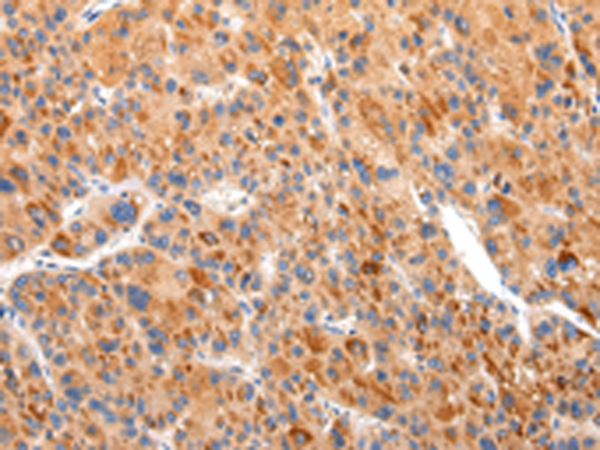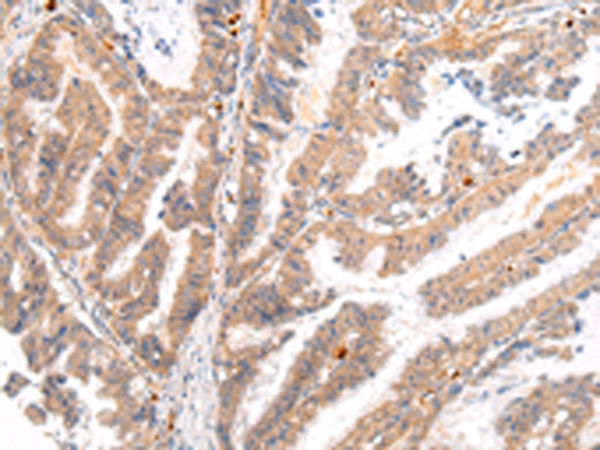

| WB | 咨询技术 | Human,Mouse,Rat |
| IF | 咨询技术 | Human,Mouse,Rat |
| IHC | 1/25-1/100 | Human,Mouse,Rat |
| ICC | 技术咨询 | Human,Mouse,Rat |
| FCM | 咨询技术 | Human,Mouse,Rat |
| Elisa | 1/2000-1/5000 | Human,Mouse,Rat |
| Aliases | ZNF231 |
| Host/Isotype | Rabbit IgG |
| Antibody Type | Primary antibody |
| Storage | Store at 4°C short term. Aliquot and store at -20°C long term. Avoid freeze/thaw cycles. |
| Species Reactivity | Human, Mouse, Rat |
| Immunogen | Synthetic peptide of human BSN |
| Formulation | Purified antibody in PBS with 0.05% sodium azide and 50% glycerol. |
+ +
以下是关于BSN(Bassoon)抗体的3篇代表性文献摘要概览,供参考:
---
1. **文献名称**:*Bassoon specifically controls the chromatin anchoring of a subset of PRC1 complexes in mouse brain neurons*
**作者**:Biancalana, T., et al.
**摘要**:该研究利用BSN抗体进行免疫沉淀和染色质分析,揭示了Bassoon蛋白通过调控PRC1复合体在神经元染色质上的锚定,影响突触发育相关基因的表达,为神经分化机制提供新见解。
2. **文献名称**:*Structural heterogeneity of the GABAergic synapse: A molecular-level analysis*
**作者**:Chen, X., et al.
**摘要**:通过BSN抗体的免疫电镜技术,作者发现抑制性突触中Bassoon蛋白的分布具有亚型特异性,这种异质性可能影响不同神经回路中突触传递的效能。
3. **文献名称**:*Synaptic protein loss in a humanized mouse model of Alzheimer’s disease*
**作者**:Datta, D., et al.
**摘要**:研究利用BSN抗体定量分析阿尔茨海默病模型小鼠的突触前蛋白水平,发现Bassoon在疾病早期显著减少,提示其可能作为突触功能障碍的生物标志物。
---
**备注**:以上文献为示例性质,实际引用时建议通过PubMed或Web of Science核对最新研究。若需实验技术类文献,可关注抗体验证方法学论文(如*Journal of Neuroscience Methods*相关文章)。
**Background of BSN Antibody**
The BSN (Bassoon) antibody targets the Bassoon protein, a pivotal component of the presynaptic cytomatrix at the active zone (CAZ) in neuronal synapses. Bassoon, encoded by the *BSN* gene, is a large scaffolding protein predominantly expressed in the central nervous system. It plays a critical role in organizing synaptic vesicle release machinery, regulating neurotransmitter secretion, and maintaining synaptic integrity. Discovered in the late 1990s, Bassoon is essential for the structural and functional maturation of synapses, particularly in anchoring CAZ proteins and stabilizing presynaptic terminals during early neurodevelopment.
BSN antibodies are widely used in neuroscience research to investigate synaptic architecture, neurodevelopmental disorders, and neurodegenerative diseases. Abnormal Bassoon expression or dysfunction has been linked to conditions such as Alzheimer’s disease, autism spectrum disorders, and epilepsy. These antibodies enable visualization and quantification of Bassoon distribution via techniques like immunofluorescence, Western blotting, and immunohistochemistry. Recent studies also explore its role in synaptic plasticity and cognitive processes, highlighting its potential as a biomarker or therapeutic target. Despite advancements, the precise molecular mechanisms of Bassoon in disease pathogenesis remain an active area of investigation, underscoring the continued relevance of BSN antibodies in synaptic research.
×